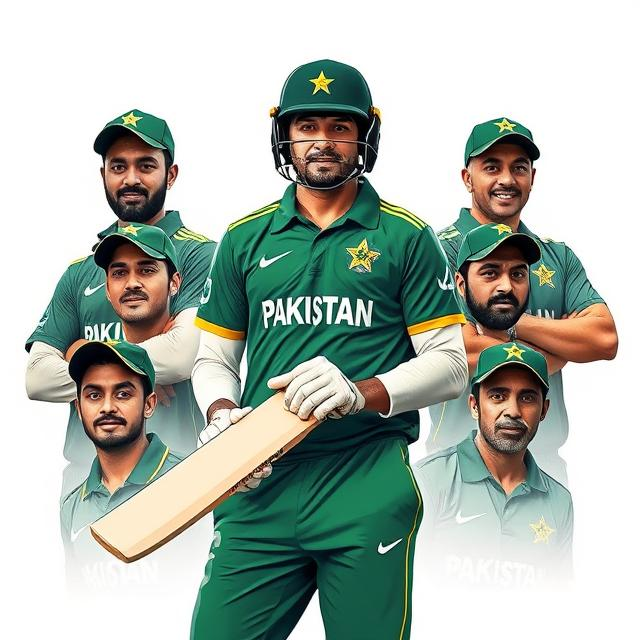Ricky Ponting’s Insights on Pakistan Cricket: A Master’s Perspective

Ricky Ponting’s Insights on Pakistan Cricket: A Master’s Perspective
Ricky Ponting, a cricketing legend, offers a unique and insightful view on the current state of Pakistan cricket. His experience as a captain, batsman, and all-around astute observer provides valuable context to the team’s recent performance and the challenges it faces. This article delves into Ponting’s comments, analyzing them through the lens of cricketing strategy, team dynamics, and the broader context of international cricket.
In recent interviews, Ponting has expressed concerns and suggestions regarding Pakistan’s performance, touching on crucial aspects of their game. Let’s explore his observations and analyze the underlying issues.
The Captaincy Conundrum: A Shifting Landscape
Ponting’s analysis often focuses on the fluctuating leadership within the Pakistani team. He has pointed out the need for consistent and decisive captaincy, acknowledging the crucial role a leader plays in team morale and strategic decision-making. Pakistan has seen several captains over the past few years, and this transition has arguably contributed to some instability in their performances.
He argues that a period of sustained leadership, with a captain who can effectively instil a clear vision and team unity, is essential for sustained success. Such a leader should not only possess the tactical acumen but also the emotional intelligence to nurture the team’s spirit.
Ponting emphasizes the importance of player-captain relationships and how a positive rapport can improve performance and confidence on the field. This sentiment resonates deeply with the principles of effective team management across diverse fields.
Batting woes and the need for innovation:
Ponting’s critique extends to Pakistan’s batting approach. He suggests a need to innovate and adapt to contemporary styles. Gone are the days when a powerful top order and a dogged lower middle order could consistently deliver. The modern game demands adaptability to diverse batting styles and conditions. He has highlighted the need for Pakistan’s batsmen to develop a more calculated and flexible approach that anticipates the varied challenges posed by different bowling strategies. The modern game requires batsmen to play in a more calculated manner and anticipate challenges better. A blend of power hitting and meticulous strokeplay, tailored to the specific conditions, is paramount.
He also touches upon the development of young talent and the crucial role of coaching in this process. He has stressed the need for coaches to provide players with the right guidance to excel in the present era.
Bowling in the Modern Era: A Need for Diversity
Ponting’s observations extend to Pakistan’s bowling attack, suggesting a need for greater variety in their arsenal. The ability to exploit different conditions and styles requires a well-rounded bowling unit, capable of dealing with different batting approaches and conditions.
He asserts that a varied approach that can adapt to changing circumstances is pivotal for success in today’s high-octane cricket world. He advocates for a bowling attack encompassing pace, spin, and guile, to better neutralize any approach from the opposition. Understanding the nuances of the conditions, as well as the psychological impact on the opposition, is essential to success.
The importance of Mental Fortitude:
More subtly, Ponting’s commentary touches upon the critical role of mental strength and resilience in cricket. He emphasizes that success in international cricket transcends just technical skill; it requires an unshakeable mental fortitude to handle pressure and setbacks. He has alluded to the importance of mental preparation and developing an indomitable mindset.
He points out that Pakistan’s players need to develop the mental resilience needed to weather tough times, which often comes with experience and focused training.
The Role of Cricket Boards and Support Staff:
Ponting also highlights the significant role played by cricket boards and support staff in shaping a team’s trajectory. He recognizes the vital importance of effective governance and the appropriate support structure.
In line with his overall message, he speaks about the importance of fostering a positive and supportive environment within the team. A harmonious relationship between players, coaches, and the support staff is instrumental in unlocking the team’s potential and achieving sustained success.
He suggests that the boards and the support staff need to focus on nurturing player development, providing ample opportunities for growth, and establishing an environment conducive to fostering a proactive and positive atmosphere. This is key to fostering a climate where players feel valued, supported, and empowered.
Looking Ahead: A Path to Recovery
Ponting’s critique, while critical at times, emanates from a place of deep respect and admiration for the game. He isn’t simply pointing out flaws; he’s offering constructive guidance, built on years of experience. His analysis can guide Pakistan toward a more robust and consistent approach to international cricket. It’s crucial to recognize the long-term implications of these observations, and the significance of adopting a multi-faceted approach to addressing these challenges.
This analysis underscores the need for sustained effort, unwavering dedication, and an unwavering commitment to excellence in order to elevate Pakistan’s cricket to new heights.
The journey to recovery will undoubtedly require a combination of tactical adjustments, strategic interventions, and an unwavering belief in the team’s ability to rise above the challenges. Ponting’s advice, viewed with a critical but constructive eye, could be instrumental in charting a new course for Pakistan’s cricketing aspirations.
In the final analysis, Ricky Ponting’s perspective offers Pakistan cricket a valuable roadmap to navigate the complexities of the modern game. His insights, coupled with unwavering dedication from players, coaches, and support staff, can propel the team towards a brighter future.
The key takeaway here is that Pakistan cricket needs to embrace a holistic approach, tackling issues from leadership and player psychology to modern cricketing strategies and support systems. Only then can they achieve sustained success on the international stage. Ponting’s insightful assessment serves as a powerful reminder of the complexities and nuances of the game.
This journey will not be easy, but with a clear vision and unwavering dedication, Pakistan cricket can certainly overcome these challenges and emerge stronger.